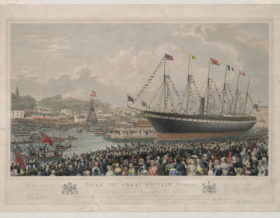British politics in the Age of Revolution
The Age of Revolution saw continued calls for reform of British politics and for removing barriers to those who were marginalised (usually because of their class, region, or faith). These became louder and more frightening for the establishment in the context of the American and French revolutions. Fearful of where radicals’ demands would end, the British government and its agents worked hard to restrict and suppress the free expression of new or subversive ideas through unprecedented Acts that disenfranchised ordinary people and quashed campaigns. A halfway measure was reached towards the end of the period when the Reform Act enfranchised more than a quarter of a million male voters. However, this reflected the growing wealth and influence of industrialists and a burgeoning middle class, but offered little meaningful improvement or representation for the interests of women or the working classes, who would go on to campaign through the Suffragist and Chartist movements.











